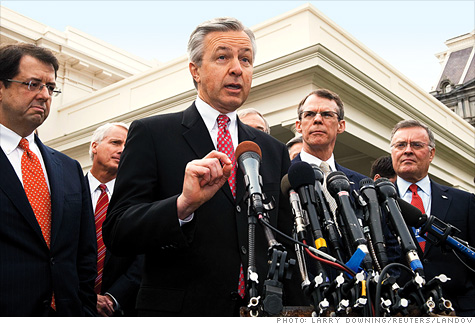Search News
 Wells Fargo CEO John Stumpf
Wells Fargo CEO John Stumpf
(Fortune) -- During the financial crisis of 2008 and 2009 when the government stepped in to save the U.S. banking system, no big institution more defiantly thumbed its nose at Uncle Sam than Wells Fargo.
"Asinine" was the word the San Francisco bank's chairman at the time, Richard Kovacevich, chose to describe Treasury Secretary Tim Geithner's plan to stress-test all big banks. CEO John Stumpf published an open letter to employees bemoaning Wells Fargo's (WFC, Fortune 500) being pressured to cancel a Las Vegas reward trip after receiving a $25 billion investment from TARP.
"These one-sided stories lead you to believe every employee-recognition event is a junket, a boondoggle, a waste," he fulminated. "Nonsense!"
Wells Fargo could go it alone, thank you very much.
A year later, Wells Fargo is doing great. Earnings are robust and its stock price has doubled. Yet it's impossible not to wonder how the maverick bank would have fared had it, in fact, been forced to fend for itself. Program after program has benefited Wells -- and its fellow banks.
For starters, the TARP money and those "asinine" stress tests indisputably steadied a shaky financial system. Trillion-dollar-plus purchases of mortgage-backed securities by the Federal Reserve kept interest rates low, facilitating mortgage activity. Ditto for Washington's $8,000 first-time homebuyer's program, a gift for a leading mortgage originator like Wells as much as for borrowers.
Add in that there basically wouldn't have been a mortgage market for the past 18 months without government-backed loans from Fannie Mae (FNM, Fortune 500) and Freddie Mac (FRE, Fortune 500) (both wards of the state) and other government groups, and it's hard to imagine a Wells recovery without the public sector.
"Wells Fargo made itself the poster child for fighting government programs," says banking analyst Richard Bove. "But clearly the government programs were necessary."
Stumpf, however, only grudgingly gives the rescue measures their due. "Clearly the government helped stabilize an unstable time," he says, but quickly adds, "We think we helped that process."
He ticks off the reasons: Wells made $800 billion in loans and loan commitments during the time it held TARP funds. It repaid those funds, along with $1.4 billion in interest. It refinanced 1.2 million loans and modified about 500,000, and forgave about $2.6 billion in principal during that time, he says. And the stress tests were a nonfactor. "It was the performance of the industry" -- notably Wells Fargo -- "that turned things around." The credits homebuyers got? "Good for customers." Support from housing agencies? "We've been FHA's largest originator for years."
Unsurprisingly, Stumpf, who earned $21.3 million last year, is also skeptical about the financial-reform legislation now in Congress. Though a fan of extending regulation to all financial players, banks and nonbanks alike, he warns of "unintended consequences" from "well-intended people."
Wells' new chief might have learned to avoid using inflammatory language, but he isn't ready to play nice just yet. ![]()






| Company | Price | Change | % Change |
|---|---|---|---|
| Ford Motor Co | 8.29 | 0.05 | 0.61% |
| Advanced Micro Devic... | 54.59 | 0.70 | 1.30% |
| Cisco Systems Inc | 47.49 | -2.44 | -4.89% |
| General Electric Co | 13.00 | -0.16 | -1.22% |
| Kraft Heinz Co | 27.84 | -2.20 | -7.32% |
| Index | Last | Change | % Change |
|---|---|---|---|
| Dow | 32,627.97 | -234.33 | -0.71% |
| Nasdaq | 13,215.24 | 99.07 | 0.76% |
| S&P 500 | 3,913.10 | -2.36 | -0.06% |
| Treasuries | 1.73 | 0.00 | 0.12% |
|
Bankrupt toy retailer tells bankruptcy court it is looking at possibly reviving the Toys 'R' Us and Babies 'R' Us brands. More |
Land O'Lakes CEO Beth Ford charts her career path, from her first job to becoming the first openly gay CEO at a Fortune 500 company in an interview with CNN's Boss Files. More |
Honda and General Motors are creating a new generation of fully autonomous vehicles. More |
In 1998, Ntsiki Biyela won a scholarship to study wine making. Now she's about to launch her own brand. More |
Whether you hedge inflation or look for a return that outpaces inflation, here's how to prepare. More |